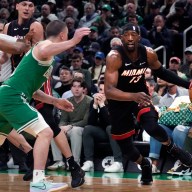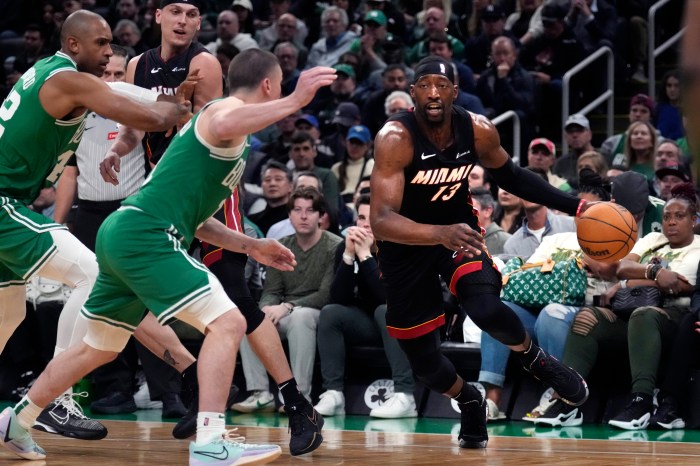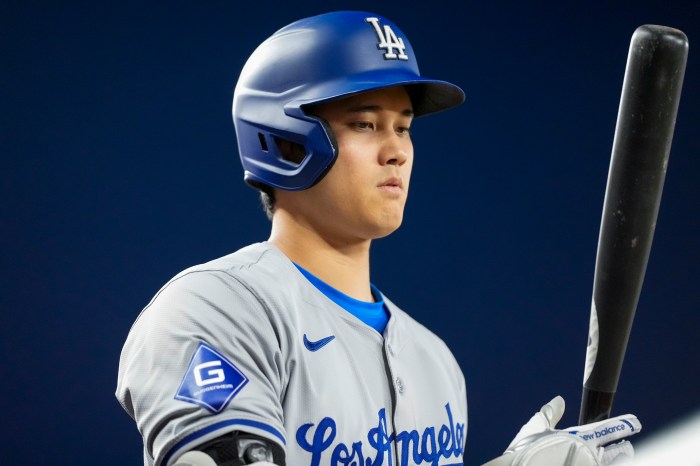On June 29, 1973, in the first year of the George Steinbrenner era, the Yankees were in their last season of the original Yankee Stadium. Only 9,611 people attended the game that afternoon, but Ray Negron was there. Negron, a 17-year-old from Queens, was caught spray-painting the outside of the stadium by Steinbrenner.
That chance encounter with Steinbrenner led to Negron’s career as a Yankee batboy, a key figure in the late-1970s events between Reggie Jackson, Billy Martin and Thurman Munson and later as a consultant to the Yankees. Recently, he published his memoir, entitled “Yankee Miracles,” and took time out to talk about the book with Metro.
The day you met Steinbrenner, what were your original plans?
I was in school. We were going to the Bronx just to hang out. We would play paddleball, handball and the whole day would pass.
How much did you know about George Steinbrenner encountering him?
I didn’t know anything about him because he wasn’t popular and didn’t know who he was. You knew [former Yankees president] Mike Burke because he had the flair, the look. You knew who John Lindsay was because he was the mayor, but you didn’t know George was.
You knew about him from January, but other than that you didn’t know about him. It wasn’t like the Yankees were a great team, so he wasn’t all over the papers. It wasn’t until the following year that he started getting that notoriety.
Initially I had no idea who he was. I had no idea until someone said you know he’s the owner of the Yankees.
When you found out that Steinbrenner hired you, what was going through your mind?
“Wow, really?” By the time I found out, I was being handed a uniform. I’m going to be in the clubhouse. When he told me after the game that he wanted me to come back, it was the whole craziness. I went from what I was doing to working for the Yankees. It was something that I’d see him do over and over throughout the years.
What was your first day as a batboy like?
They gave me a uniform. [Clubhouse attendant] Pete Sheehy told me what I was going to do. Dick Howser told me what I was going to do. He told me to go the outfield and shag. I won’t forget the first guy who actually came up to me and that was Ron Blomberg. We went out to right field and he would be the first guy that I had a catch with. I was so nervous that I short-hopped the ball.
Our plan that day was to sneak into the park anyways because in those days you can do that. That night the guys that I was there with, they were in the stands. They were like what happened. They thought I was locked up. Naturally I couldn’t talk; I had to pay attention to what I was doing. I was so nervous that I couldn’t do anything.
What were your first impressions of Thurman Munson and what are some of the things you found out about him?
Gruffy. He didn’t say much. He kept going and went about his business, where [Bobby] Murcer was real cool.
He had a voice like Curly of the Three Stooges, real high-pitched and it was almost like to scare me. He did like an, “Oh no,” and everybody would laugh. He did like the greatest Curly impression. Later on as he walked by me, he would by like, “Nyuk-Nyuk.” He could very funny.
One of the memorable stories in the book is about Munson screaming out to you “two cheesies” when he wanted a cheeseburger. What’s the best way to describe those instances?
One he got comfortable, he would scream out, “two cheesies!” I knew what I would have to do. I’d go to Pete and I’d say I’m running to get two cheesies. I’d run out through center field across the street into the McDonalds and whenever I went there, they knew what I wanted. I would have two fingers in the air and they knew I was on a Munson run and the guys would always throw in some French fries for free.
You were drafted by the Pirates in the second-round, how much did becoming a batboy with the Yankees help?
When I got there, I wanted to play major-league baseball. I was a serious player. When I was a batboy I was more confident. When you’re taking infield and batting practice with the Yankees, you’re more confident. I thought I had a legit shot and it helped. During batting practice they would see me and they would file reports on me and that’s how I ended up going so high in the draft.
How did you end up returning to the Yankees once playing baseball did not work out?
Once I proved to the Pirates I couldn’t hit, Sandy Alomar and me became close because I babysat his kids. He told Billy Martin I had been released. Billy called me at my mother’s house and he said what are you hiding from the world. I was embarrassed because I left with such fanfare. I was humiliated and Billy said stop this s— and you get here tomorrow and when I reported to Shea Stadium he had me throwing batting practice and we’ll see if you can re-sign with somebody.
How did your relationship with Billy Martin start?
A: One his scouts from New York, Emil Gall, had told Billy about me. In essence when the Tigers came to New York, Billy came to New York, so that day he started hitting ground balls. That’s how we ended up striking up a relationship.
He became my baseball father. We always talked and the great thing about Billy was that he knew I loved George. He knew what George had done for me. He loved George, but he was like a big brother and they would have these fights.
What did Billy say to you about Reggie Jackson?
He always wanted me to stay close to Reggie. He knew that me and Reggie had become tight. He would say the closer you are to Reggie the easier it makes my job in the clubhouse. Fran Healy was a guy Reggie relied on. When Healy was not there, Billy would tell me to tell Reggie, he’s DHing or playing right field. He knew that if he delivered those messages to Reggie it would turn into a knockdown, drag out.
George always knew what was going on. He would say you were his eyes and his hears and told me to do whatever I was doing to keep them motivated.
What was Reggie’s response to you delivering Billy’s message about his role in the lineup?
Some days he would respond OK. Some days he would get upset because you’re the only friend I have that’s also his friend and I don’t know how to take it. Then he would always say at the end of the day, I know you’re there for me.
What was your vantage point of the Jackson-Martin incident in the dugout in Fenway Park on June 18, 1977?
I was sitting next to Billy when he goes to Paul Blair, get to right field, this guy doesn’t want to [expletive] play. When he said that, I ran to the other side of the dugout because I was scared. If you look at old newspaper clippings, I’m covering the camera that was stationed at the beginning of the dugout and the headline read, “Yankee cover up.”
When Reggie took his glasses, it was an invitation and he knew Billy. Billy might throw a punch real quick depending on what Reggie might say. You saw the glasses go off and I was in tears at the end of the dugout because it was looking at your father and your brother ready to get into a fist fight.
Yogi Berra held Billy down. Howser held them down. Finally we got Reggie out of the dugout and the next morning, Billy uncharacteristically got to the ballpark very early because he had a meeting with Reggie and Gabe Paul. That meeting went so bad because Billy started screaming at Gabe. So instead of going back to his room, Billy walked to Fenway. I was there and he said to me let’s take a walk. We walked into the dugout and he felt compelled for whatever reason to explain to me what happened and why it happened. It’s something he didn’t have to do but that’s where our relationship had been.
What was Martin’s explanation?
He just felt that Reggie was loafing. He felt he had to set an example. He didn’t want to go as crazy as it did. He was sitting down as Reggie’s running in and Billy was sitting down and Reggie started screaming. He said a couple of things and the one thing that set Billy off was he called him an old man.
Eventually it settled down, when did you know that had happened?
You can see after the three home runs in Game 6, I was looking for Reggie and I walked into the manager’s office and him and Billy are sitting arm-in-arm in the sofa and smiling. It is what I wanted because I loved them so much. For me, it was very personal. At that time if you’re asking who I liked better, I couldn’t do it.
What was your reaction to Billy Martin getting fired?
The first two times, it was very painful because having Billy there you can have run of the clubhouse. I’m the manager’s boy, I’m the owner’s boy, I’m the superstar’s boy, I’m the captain’s boy, but how much better could I have it. I could walk in the clubhouse and do my job and not have players jealous because anything I did for Reggie or Billy, I would do for them right down to the 25th player.
Besides Jackson and Munson, who were some of the other memorable players from that time?
Fred Stanley I was very close to. He was just a fun guy. Lou Piniella I adore, he was so much fun and yet he was so intelligent about the game and he was giving me hitting tips. Bobby Murcer, he was as fine as a good wine. He got better with time. Blomberg, he was the first guy to say I was the team’s little brother. Luis Tiant, Mike Torrez, when I see him to this day, he gives me a kiss. Don Gullett, I probably did more for him than for Reggie because he was always hurt. Catfish Hunter, Bucky Dent.
Mickey Rivers, he was a comical guy. He’s full of jokes and he can just come up with them and everybody could laugh. Munson just adored him.
There will never be a team like that, but from a standpoint of pure family, it was like a family. It was like 25 brothers and George was the father and Billy was the uncle that you loved coming to visit. I would say that because he would have to leave because of what was going on. Everyone would always look forward to the uncle coming to visit but unfortunately it would be a year. He always hoped that the genius would stay longer than a year because Billy would always talk about the genius in Casey Stengel. That’s what George always wanted but the demons always came back. When they came back, it was very scary.
The demon was alcohol and it didn’t help that Billy wasn’t afraid of anybody. Next to George, probably the toughest man I had ever known. People always ask me what was Billy really like in my eyes. If you ever see the movie a Bronx Tale, he was Sonny (Chazz Palminteri’s character).
What was your reaction to Bob Lemon replacing Martin?
I hate to say that Lemon was the right guy at the right time, but he was. There was too much tension with what happened with Billy. I still say Billy would have calmed down, but Lemon didn’t hurt. He did the lineup card, let everyone play. That was all there was. It wasn’t like there was a magical potion because there wasn’t. I do believe that Billy would have won anyway. That ’78 team, that was Billy’s team.
What was the reaction to the Old Timer’s Day announcement that Billy Martin would be returning in 1980, though he returned a year earlier?
Reggie was quite upset. He had heard it on the TV that Billy was going out. I could see the look in his face; I could see the anger. I knew that he was just talking and I said Reggie if you’re out of here, I’m out of here and I said it because it’s what he needed to hear. I used to say the same thing to Billy.
How did Reggie hitting the three home runs turn into a chance meeting with John Lennon in the offseason?
Mentally, it was the highest he would ever be. He was the biggest guy in sports. One day we’re running through Central Park about a month after the season ends and we see this couple. We couldn’t help but recognize John Lennon and Lennon said, ‘Good show, you put on a good show.’ Reggie stopped, they shook hands and they had a nice two-minute conversation and I never saw Reggie smile more than that. After they said goodbye, we started running again and he said can you believe a Beatle knew what I did in the World Series. At the time, Reggie was everywhere. He was Michael Jordan. It was literally Reggie-mania. It was crazy after the World Series. He was the man and he knew it.
How did Reggie show others he was the man?
Just his strut, everything was accentuated more. Everything was with more of a flair. Everything had a terrific cosmetic touch to it. He knew he was cool. In those days we would say he was bad and he knew he was bad and well-deserved. New York didn’t probably have a player with such flair [since] Babe Ruth.
What was mindset going for a three-peat in 1979?
The motto going into spring training was one more time in ’79. We even had T-shirts that said that. But you see what history says happened in ’79.
Where were you and how did you find out that Thurman Munson had died in a plane crash?
I was at Arthur Rubenstein’s house. We played sandlot baseball together. I was playing the Stan Musial league for guys that had been released. I was at his house because he was one of the only wealthy guys I knew with a batting cage in his backyard. I was taking BP and his mother came out running and crying for me that Thurman may have been hurt. When I ran inside Bill Beutel tells us that Thurman Munson had been killed.
It was devastating for the city because Thurman was such a loved guy. He was termed a man’s man and he was termed the blue-collar guy. So the firefighters, the construction workers, the vendors, they all loved Thurman. I still get chills.
It was probably the first time I had ever gone through death of someone that I had felt close to.
What made you leave the team in the late-1970s?
I wanted to pursue acting because in the 1970s. I was doing commercials with Reggie. Warner Bros. tested me for a co-starring role with a young actor who was going to make his first role. It was Andy Garcia. I was in Blue Skies and I got the bug. Then I ended up working in the “Cotton Club” with Richard Gere. We’ve been friends for 30 years.
As the Yankees went through the 1980s and not winning championships while managers came and went, how closely did you follow the team?
I followed them closely and George kept tabs with me. Every once in a while he would call. I was always there for him and later on when he had a little bit of an interest in Dwight Gooden and Darryl Strawberry he wanted me to help them out. I put them in rehab programs and they just ended up coming back.
How did this book come about, what was the process of developing it and recalling all the stories?
No. 1, throughout the years I was asked by different writers to do a book because the book they wanted to do I didn’t want to do. So, finally, I’m in a hospital with Robinson Cano in his rookie year. I saw how he struck this relationship with this kid and how important it was and it reminded me of throughout the years of George, Reggie, Thurman and Bobby and all the different types of visits.
I told the Boss I was going to do a childen’s book. It’s important for me to do it and he said go and do it. Nobody thought he was going to give permission because he didn’t give permission to anyone that worked in the organization to do books. But he said, go ahead and do it. I ended up my first book, the Boy of Steel and when I did that, something surprising happened. It became a best seller and it shocked everybody.
After I did these books, when I saw he was getting sick, I started talking to him about doing my memoir because I wanted to do it before he died. One day I sat down with him and I showed him a letter that he once wrote to me. He was surprised that I kept it in my wallet. I keep it for luck and it lifts my spirits. In that letter, he talked about how proud he was of everything I accomplished. I would not have become what I became without him and he said it was not true. He would always say I may have had a little do with it, but what you accomplished meant as much as winning my world championships.
I want to do my story because I want the world to know what you meant to me, but what you meant to a lot of people. It’s a very important story, especially for young people and he looked me in the eye and he said you go and do that.
Every chapter has a scenario where it talks about a song. All these songs, I had CD after CD of the 1970s and forward and they all took me back. The last song was Glady Knight, “The Best Thing that Ever Happened to Me,” and that song came on as I’m punching the dashboard because I got writer’s block and I’m getting crazy trying to write a chapter on George. The song said to me write the love and pain and agony that you’re feeling. At the end of the day, don’t be afraid to say goodbye because he was the best thing that ever happened to me. It was my favorite chapter in the book because I called Gooden and said I need to read something with you together. As we read it, me and Dwight just cried. What he said, it’s too beautiful not to write.
Did Steinbrenner ever reveal the reason for hiring you in 1973?
I would say to him, “Boss, four people were with me that day, two lived half their lives in prison, one died of AIDS due to a dirty needle and the other was shot at close range in a drug bust gone bad.” I said, “What was going to happen to me had you not interceded that day?” He would look at me in the eye and he would say, “No, No, No. The day that I caught you, your story was already told. That story was already written and I’ve always known that.”
That’s the only thing he told me. Other than that, he didn’t want to take credit. He loved our relationship. He loved what happened because it made him feel like a street guy. It’s like a cool moment in someone’s life. He liked telling the story of when it happened and I enjoyed listening to him telling the story. The first time he told Henry Kissinger the story was one of the biggest thrills in my life.
What impression do you believe fans will get of Steinbrenner from this book?
A very powerful man who happened to be a good guy.
You have a movie coming out on your series of children’s books. Do you see this book being transformed into a movie?
The guy that did Hugo and Hunger Games is representing the project. Jason Dravis. You don’t know what’s going to happen. You never know what’s going to happen with something like it could end up being another Bronx Tale. If it happens, Chazz Palminteri will be Billy Martin and Michael Douglas will play George.
What legends or stories were you unable to get into the book?
Every time I run into someone or see an ex-player from that time, it reminds of a story. I could have written a 1,000-page book easily, but I didn’t want to go there. There was so many things that I wrote that didn’t even make it. I wrote it like a movie treatment.
How did you pick Sally Cook as opposed to a sportswriter from that era?
I wanted a woman because a woman is going to let me say sensitive and let me say within my soul and not let me lose my heart. She let me stay in my zone from the standpoint of the story. You think of George, you think of Billy, you think of hardcore and I wanted to tell the other side.
How did the families of Thurman Munson and George Steinbrenner receive the book?
The two most important phone calls that I received pertaining to this book, the first was Diana Munson. I sent her the chapter even through everyone said, “Don’t it might be too heavy for her,” but I owed it to Thurman. I gave it to her in Tampa and she went back to her hotel. Within two hours the phone rang and she’s crying and she said, “I have to tell you, you got it right, you really got it right. You really told my husband, the way he was really was.”
That was a major compliment. I thought that was awesome. I was so happy because if she said, “No I don’t want this,” we wouldn’t have Thurman in the book.
The next most important call was Jennifer Steinbrenner. She called me and she was very sweet. The kids they loved their dad. She said that she really loved the book. I was petrified, when you’re talking about someone you love as much as they love their dad. If they’re not supportive, the project is no good to anybody. If she wasn’t happy with it, then I can’t promote it. She wanted to talk about the Bobby Murcer chapter and she talked about the Munson chapter and said she was too young to know him and enjoyed reading it about him. It was a major relief and I told her it was one of the most important phone calls of my life.
Follow Yankees beat writer Larry Fleisher on Twitter @LarryFleisher.


















